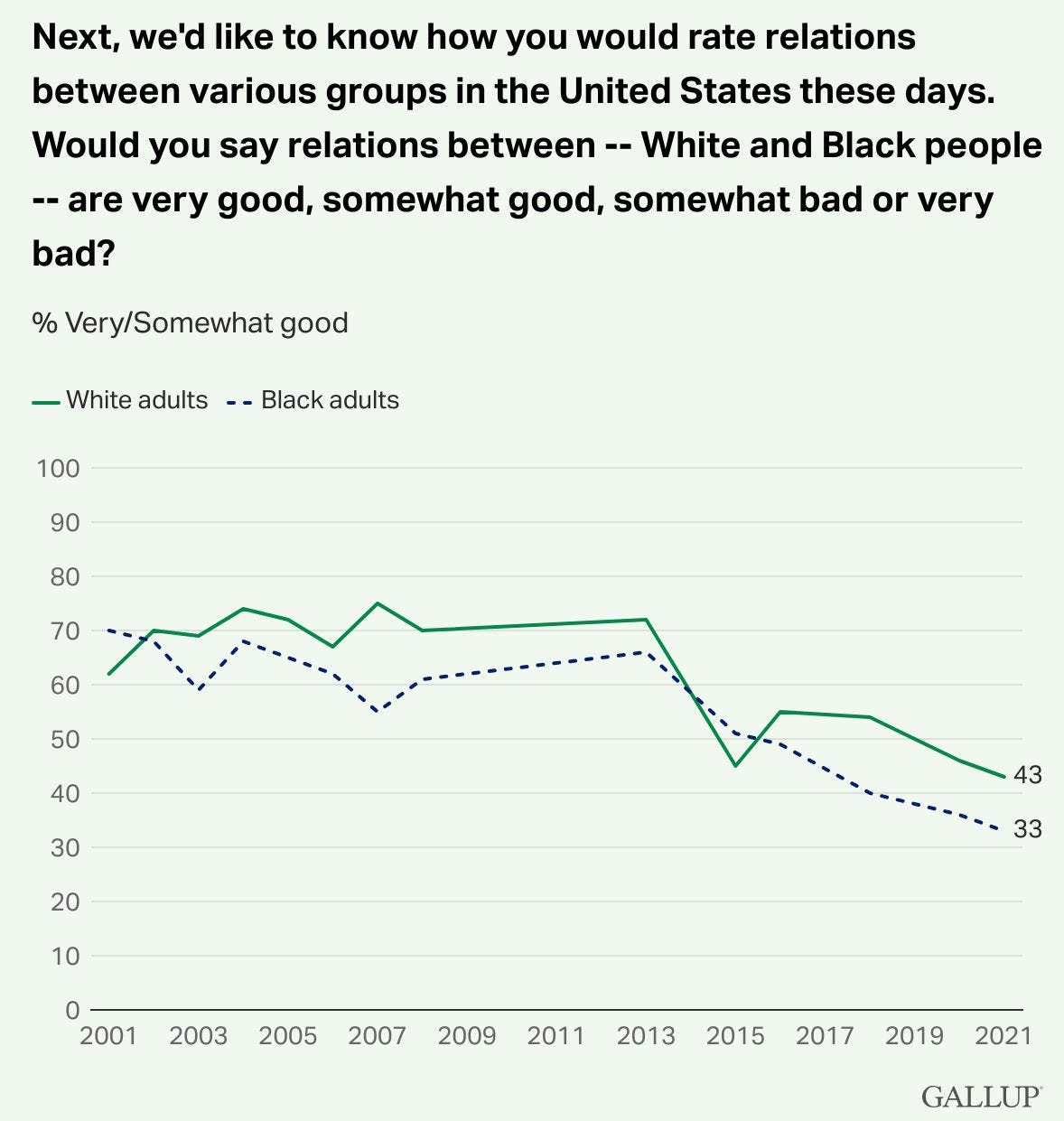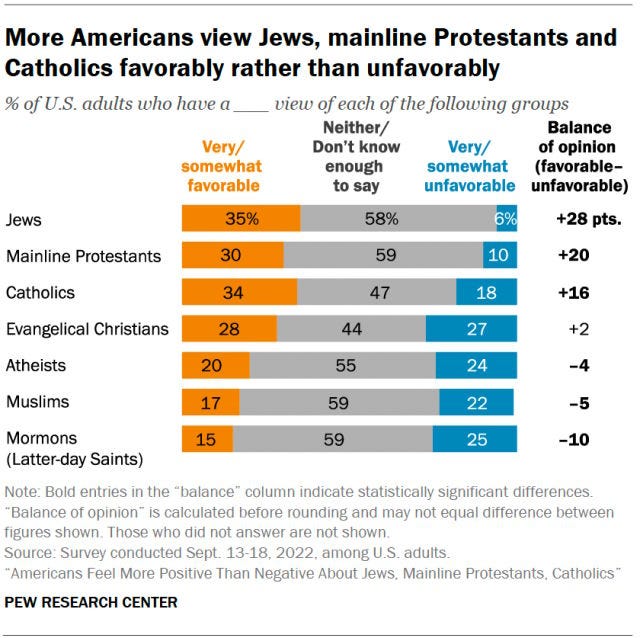Jewish Americans are feeling unsettled
Increasingly squeezed between the new leftism and the new rightism.

America is an unsettled place. These days, it feels like every racial and religious group has reason to fear being singled out and persecuted, either with official discrimination or with outright violence.
Hispanic Americans — many of whom voted for Donald Trump — must now endure video after video of masked ICE agents storming buildings and carting away peaceable people, even some with U.S. citizenship. White Americans are subjected to an endless parade of stories about elite universities, publishers, and other institutions refusing to hire them no matter how qualified they are. Asian Americans were subjected to the terror of a wave of violent racist attacks a few years ago, even as they also hear about being kept out of the Ivy League. Black people have been somewhat less targeted for persecution in recent years than before, but still suffer some racist terror attacks, even as the Trump administration tries to scrub mentions of Black contributions from government communications. Muslim Americans suffered a wave of Islamophobic attacks in the mid-2010s, peaking around the time of Trump’s first election. Indian Americans, Haitian Americans, Somali Americans, and various other recent immigrant groups have all been the targets of xenophobia.
Americans keenly feel this general sense of racial, ethnic, and religious tension. Perceptions of race relations went into a steep long-term decline around a decade ago:

Jewish Americans1 have not been immune to this trend. In the 2010s, there was a wave of antisemitism on social media. In 2017, rightists at the infamous Charlottesville rally shouted “Jews will not replace us!”. And 2018 marked the deadliest antisemitic terror attack in the country’s history, when a white supremacist killed 11 Jews at a synagogue in Pittsburgh. There was also another less deadly synagogue shooting by another white supremacist in California in 2019. And in December of 2019, there were several attacks on Jews by a fringe sect called the Black Hebrew Israelites.
But despite these attacks, Jewish Americans could still tell themselves, even in the turbulent 2010s, that they were secure and accepted in their country. Surveys found that Americans were friendlier toward Jews than toward almost any other religious group:

This is probably not just lip service. Switching from face-to-face interviews to anonymous online surveys does NOT prompt Americans to express more antisemitism, as it would if people were just keeping their dislike of Jews under wraps for the sake of political correctness.
Jews also benefitted from not being at the center of any of the identity conflicts of the late 2010s. Although most Jews are racially White, their ancestors largely did not own any slaves, and they were not numerous or influential at the time of the founding of America; thus, they were able to partially dodge progressive accusations of white supremacy. And because they’re not a recent immigrant group, Jewish Americans also escaped the anti-immigrant backlash of the MAGA movement. At a time when conflicts over race and immigration made almost everyone in America feel threatened and unsettled, Jews were still able to feel relatively settled in their nation.
Then, of course, came October 7th, 2023. Hamas’ attacks on Israel, and Israel’s subsequent attacks on Gaza, rocketed the Palestinian cause from just one element in the left’s mosaic of issues to its central, defining cause. Although technically, opposition to the state of Israel is not the same thing as antisemitism, not all of the activists in the Palestine movement make such a clear distinction. Around the world, there has been a massive rise in antisemitic incidents — desecration of Jewish cemeteries and Holocaust memorials, vandalism of Jewish-owned businesses with no connection to Israel, attacks on synagogues, and so on.
The U.S. hasn’t been insulated from this wave. The FBI, which is unlikely to conflate anti-Israel sentiments with antisemitism (or at least, was unlikely to do this under President Biden), nevertheless recorded a 63% increase in anti-Jewish hate crimes from 2023 to 2024. The two people slaughtered in a gruesome execution-style killing in May at the Capital Jewish Museum in Washington D.C. ended up being Israeli embassy staffers, but the killer — who told the police “I did it for Palestine, I did it for Gaza” — couldn’t have known who they were. He just wanted to shoot someone at a Jewish museum, and assumed that this would strike a blow for Palestine.
It’s hard to forget this iconic image, from a rally of the New York chapter of the Democratic Socialists of America on October 8, 2023 — before Israel began its reprisals on Gaza:

To some, this simply seems like the continuation of a very old pattern, in which each country inevitably becomes hostile to Jews after a temporary period in which it was safe and welcoming, eventually forcing Jews to flee. In March of 2024, Franklin Foer wrote an article for The Atlantic entitled “The Golden Age of American Jews is Ending”. He wrote:
Liberalism helped unleash a Golden Age of American Jewry, an unprecedented period of safety, prosperity, and political influence. Jews, who had once been excluded from the American establishment, became full-fledged members of it. But that era is drawing to a close…Americans maintain a favorable opinion of Jews…But the memory of how quickly the best of times can turn dark has infused the Jewish reactions to events of the past decade. “When lights start flashing red, the Jewish impulse is to flee,” Jonathan Greenblatt, the head of the Anti-Defamation League, told me…
Back in 2016…after [Trump] won, many Jews actually hatched contingency plans…An immigration lawyer I know in Cleveland told me that he had obtained a German passport, and suggested that I call the German embassy in Washington to learn how many other American Jews had done the same…
I [recently] saw signs of flight in Oakland, where at least 30 Jewish families have been approved to transfer their children to neighboring school districts—and I heard similar stories in the surrounding area. Initial data collected by an organization representing Jewish day schools, which have long struggled for enrollment, show a spike in the number of admission inquiries from families contemplating pulling their kids from public school.
I wouldn’t panic just yet. But I think there are multiple forces that are causing American Jews to feel unsettled — a perfect storm. These are:
Extremists looking for clout in a particularly turbulent time
The resurgence of antisemitic memes, driven by the rise of social media and foreign influence campaigns
Jews’ declining importance in the American elite


